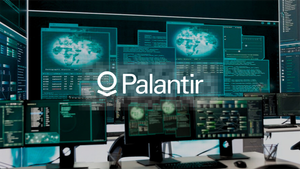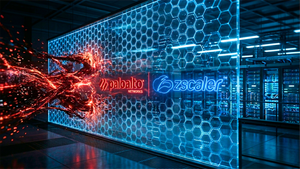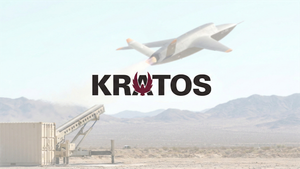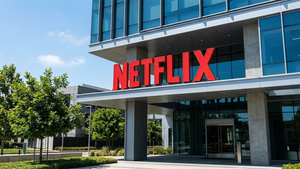The Canada vacuum packaging market is expected to grow at a CAGR of 2.2% from 2024 to 2034. Food wastage is a significant concern, with Canadian households wasting about 300 pounds of food annually. To combat this, 77% of Canadians using food storage products aim to reduce food waste. Vacuum-sealed packaging is gaining popularity in households and industries alike. This growing awareness is driving market growth.
NEWARK, DE / ACCESSWIRE / November 12, 2024 / The global vacuum packaging market is set to continue its steady growth, with an estimated market size of USD 21.1 billion in 2024 and a projected value of USD 26.5 billion by 2034. This growth represents a compound annual growth rate (CAGR) of 2.3% from 2024 to 2034, according to a recent market study. The food and beverage sector remains the primary driver of demand, with vacuum packaging being integral to the preservation of fresh food and the growing trend of online grocery shopping.
Key Drivers of Growth in the Vacuum Packaging Market
Sustainability and Food Waste Reduction
Vacuum packaging plays a critical role in reducing food waste by extending the shelf life of perishable goods. With approximately 60% of global food waste originating from households, the growing consumer awareness around food preservation is driving the adoption of vacuum packaging solutions.Increasing Demand for Convenience Foods
As busy lifestyles and urbanization continue to rise, particularly in countries like China and Japan, there is an increasing reliance on packaged and ready-to-eat food products. Vacuum packaging enhances the shelf life of convenience foods, making it a valuable solution for consumers and manufacturers alike.Shift Towards Transparent Packaging
As consumers seek greater transparency in the products they purchase, the demand for transparent packaging is on the rise. Vacuum packaging, often produced using clear plastic, aligns with this trend, offering enhanced product visibility and contributing to the growth of the market.Expansion into Healthcare and Pharmaceutical Industries
Vacuum packaging is finding increasing application in the healthcare and pharmaceutical sectors. Its ability to keep products sterile and contamination-free makes it ideal for packaging medical devices, surgical instruments, and pharmaceutical products, creating new growth opportunities outside the food industry.Technological Innovations in Packaging Materials
The development of eco-friendly vacuum packaging solutions, including recyclable, biodegradable, and compostable materials, is resonating with environmentally conscious consumers. Manufacturers' focus on using sustainable materials is helping to drive market growth by meeting demand for greener packaging options.
Regional Insights into the Vacuum Packaging Market
Countries |
CAGR (2024 to 2034) |
India |
4.9% |
United States |
1.9% |
China |
3.2% |
Spain |
3.1% |
Canada |
2.2% |
Key Takeaways from the Vacuum Packaging Market
The global vacuum packaging market is projected to reach USD 26.5 billion by 2034, growing at a CAGR of 2.3% from 2024 to 2034.
Food packaging remains the dominant driver of market growth, accounting for over 73% of vacuum packaging sales.
Vacuum packaging helps reduce food waste by extending shelf life, addressing growing global concerns over food loss.
Transparent vacuum packaging is gaining popularity as consumers demand clearer visibility of product contents.
Convenience food demand is increasing globally, particularly in urbanizing regions like China and Japan, fueling vacuum packaging adoption.
The healthcare and pharmaceutical industries are expanding the use of vacuum packaging for sterile and contamination-free storage.
The market is benefitting from technological advancements, including eco-friendly, recyclable, and biodegradable packaging materials.
Polyethylene (PE) continues to be the most widely used material for vacuum packaging due to its flexibility and durability.
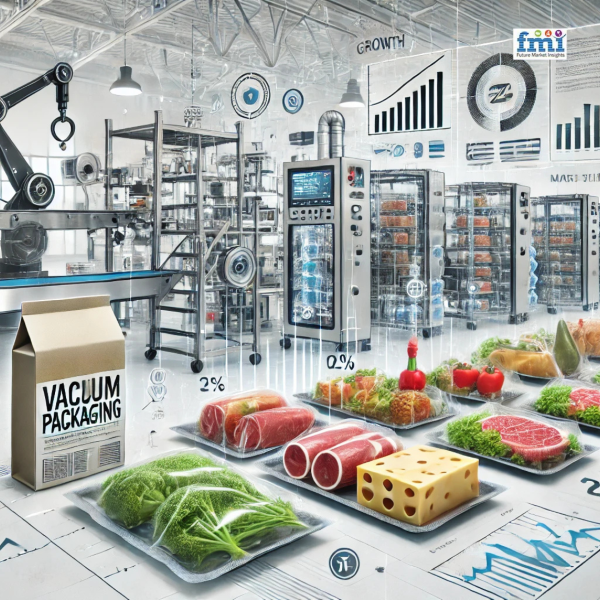
"Advancements in eco-friendly materials and increasing adoption in healthcare and pharmaceuticals are expanding the market's applications." says Senior Consultant Ismail Sutaria in Packaging at Future Market Insights (FMI).
Prominent Drivers of the Vacuum Packaging Market
Growth in Global Meat Consumption
Rising meat consumption globally, coupled with the need to preserve freshness and prevent spoilage, drives the demand for vacuum packaging in the meat sector.Increasing Demand for Transparent Packaging
Consumers' preference for transparency in packaging, allowing them to see the product inside, is promoting the growth of transparent vacuum packaging solutions.Rising Health and Hygiene Awareness
Vacuum packaging's ability to reduce contamination and preserve food quality in a hygienic manner is driving adoption in both food and non-food sectors.Regulatory Support for Food Safety Standards
Strict food safety regulations in regions like North America and Europe are encouraging the use of vacuum packaging to meet preservation and quality standards.Consumer Demand for Longer Freshness in Non-Food Products
Vacuum packaging is also gaining traction in non-food industries such as pharmaceuticals, where it is used to preserve sensitive products like medications and medical devices.Growth of the Processed and Packaged Food Market
As the processed food market expands, particularly in emerging economies, vacuum packaging is increasingly used to keep products fresh for longer periods.Urbanization and Changing Consumer Lifestyles
As more people live in urban areas with fast-paced lifestyles, there is a growing need for convenience foods and packaging solutions like vacuum sealing.Rising Popularity of Meal Kits and Pre-Packaged Ingredients
The popularity of meal kits and pre-packaged ingredients, especially in the U.S. and Europe, is contributing to the growth of vacuum packaging in the food sector.Improved Distribution Channels and Global Supply Chains
Efficient distribution systems and global supply chains are boosting the need for vacuum packaging to maintain product freshness during transportation.
Challenges Faced by the Vacuum Packaging Market
High Production and Equipment Costs
The initial investment required for vacuum packaging machinery, such as vacuum sealers, pumps, and chambers, can be prohibitive, especially for small and medium-sized businesses.Risk of Anaerobic Bacterial Growth
While vacuum packaging extends shelf life by removing air, the oxygen-free environment can promote the growth of anaerobic bacteria, which can lead to foodborne illnesses and spoilage.Limited Consumer Awareness
Despite the growing popularity of vacuum packaging, there remains a lack of widespread consumer education on how to use vacuum-sealed bags effectively, which can limit adoption in households.Environmental Concerns Over Plastic Use
Although vacuum packaging can reduce food waste, concerns about the use of plastic materials, particularly in non-recyclable or single-use formats, pose environmental challenges.Challenges in Recycling and Disposal
While advancements are being made in eco-friendly materials, not all vacuum packaging options are easily recyclable, leading to waste management issues and environmental impact.Technical Complexity and Maintenance of Equipment
Vacuum packaging systems can be complex to operate and maintain, requiring specialized training and ongoing maintenance to ensure optimal performance, which can be a barrier for smaller businesses.Market Fragmentation
The vacuum packaging market is fragmented, with various regional players, small-scale manufacturers, and niche producers competing with large multinational corporations, making it challenging for companies to stand out and gain market share.Regulatory and Compliance Issues
Adhering to diverse and evolving food safety regulations, especially in international markets, can be challenging for vacuum packaging manufacturers, as different regions have different packaging and labeling standards.Consumer Resistance to Changes in Packaging
Some consumers may be resistant to adopting vacuum-sealed products due to unfamiliarity with the packaging technology or concerns about the perceived quality or longevity of the product inside.
Competitive Landscape of the Vacuum Packaging Market
The vacuum packaging market is highly fragmented, with no single player dominating the space. It hosts a diverse range of companies, from small players to larger enterprises. Due to relatively low entry barriers, new companies continue to enter the market, maintaining competition for established players.
Given the significant role packaging plays in the food and beverage industry, many food companies are increasingly turning to vacuum packaging solutions. This has led to a growing number of partnerships between food businesses and vacuum packaging manufacturers. As sustainability becomes a top priority for the food sector, these companies are actively seeking innovative packaging solutions to reduce their environmental impact.
Recent Developments
In August 2024, Paulig's easy-open recyclable vacuum coffee packaging won an award in a Nordic packaging competition named ScanStar.
Also in August 2024, Gunze launched Purewrap FS35NB and FS40NB. These are thin-blown films for vacuum packaging of boilable food products.
Another development in August 2024 was ExxonMobil teaming up with Brazilian player Videplast to launch the Exceed XP 7052 Ml performance polyethylene.
Leading Vacuum Packaging Brands
Sealed Air Corporation
Mondi Group Plc
The Vacuum Pouch Company Ltd.
A Synnovia Company
Swiss Pack Europe
Klöckner Pentaplast Group
FLEXOPACK S.A.
Mannok Pack
Coveris Holdings S.A.
Amcor plc
Winpak Group
Plastissimo Film Co., Ltd.
Adapa (Schur Flexibles Holding GesmbH)
Plastopil Hazorea Company Ltd.
CLONDALKIN GROUP
Access the Full Report on Vacuum Packaging Market Market Trends and Projections Now! https://www.futuremarketinsights.com/reports/vacuum-packaging-market
Key Segments of Market Report
By Material:
Based on the material, the vacuum packaging market can be divided into Polyethylene (PE), Polypropylene (PP), Polyamide (PA), Ethylene Vinyl Alcohol (EVOH), and Polyethylene terephthalate (PET).
By End Use:
Based on the end use, the vacuum packaging market is divided into food and non-food. The food segment is further subdivided into meat, poultry, seafood, dairy products, fresh produce, ready meals, and preserved food.
By Film Structure:
Based on the film structure, the vacuum packaging market can be divided into the following segments: monolayer, 3 layers, 5 layers, 7 layers, and more than 7 layers.
By Region:
The sector has been analyzed with the following regions covered: North America, Latin America, Europe, South Asia, East Asia, Oceania, and the Middle East and Africa.
Authored by:
Ismail Sutaria (Lead Consultant, Packaging and Materials) has over 8 years of experience in market research and consulting in the packaging & materials industry. Ismail's strength lies in identifying key challenges faced by the client and offering logical and actionable insights to equip the clients with strategic decision-making power.
Ismail has been an instrumental part of several transformational consulting assignments. His key skills include competitive benchmarking, opportunity assessment, macroeconomic analysis, and business transformation advisory. Ismail is an MBA holder in Marketing and has a Bachelor's Degree in Mathematics.
Explore FMI's related ongoing Coverage in Packaging Domain:
The vacuum-sealed packaging market size is expected to reach USD 13.2 billion in 2024 and grow at a 4.3% CAGR, reaching USD 20.1 billion by 2034.
The demand for vacuum skin packaging, valued at USD 8.4 billion in 2024, is expected to surpass USD 11.5 billion by 2034, growing at a CAGR of 3.2%.
The global thermoform packaging market value is expected to grow from USD 55.5 billion in 2024 to USD 76.1 billion by 2034, with a CAGR of 3.2%.
The global biodegradable packaging market size is projected to reach USD 218.13 billion in 2024 and grow at a CAGR of 4.9%, reaching USD 352.73 billion by 2034.
The sales of beverage packaging is expected to be valued at USD 142.3 billion in 2024 and grow to USD 194.3 billion by 2034, with a CAGR of 3.2%.
The demand for protective packaging is projected to grow from USD 29.7 billion in 2024 to USD 47.8 billion by 2034, up from USD 28.3 billion in 2023, with a CAGR of 4.7%.
The global meat packaging market value is estimated at USD 7.4 billion in 2023 and is expected to grow at a steady CAGR of 5.2%, reaching over USD 12.3 billion by 2033.
The global hot fill packaging market size is estimated at USD 3.2 billion in 2024 and is expected to reach USD 4.8 billion by 2034, growing at a CAGR of 4.2%.
The FMCG packaging market value is projected to grow at a CAGR of 5.8%, reaching USD 443.1 billion in 2023 and surpassing USD 778.7 billion by 2033.
The confectionery packaging market size is expected to grow at a CAGR of 4.4%, reaching USD 11.37 billion in 2023 and surpassing USD 17.50 billion by 2033.
About Future Market Insights (FMI)
Future Market Insights, Inc. (ESOMAR certified, recipient of the Stevie Award, and a member of the Greater New York Chamber of Commerce) offers profound insights into the driving factors that are boosting demand in the market. FMI stands as the leading global provider of market intelligence, advisory services, consulting, and events for the Packaging, Food and Beverage, Consumer Technology, Healthcare, Industrial, and Chemicals markets. With a vast team of over 400 analysts worldwide, FMI provides global, regional, and local expertise on diverse domains and industry trends across more than 110 countries.
Contact FMI:
Future Market Insights Inc.
Christiana Corporate, 200 Continental Drive,
Suite 401, Newark, Delaware - 19713, USA
T: +1-347-918-3531
For Sales Enquiries: sales@futuremarketinsights.com
Website: https://www.futuremarketinsights.com
LinkedIn | Twitter | Blogs | YouTube
SOURCE: Future Market Insights Inc.
View the original press release on accesswire.com

